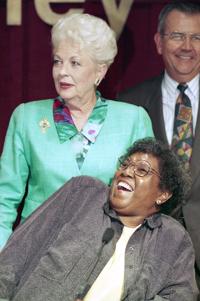
The 2024 presidential election result was definitive: Not her, either.
In 2016, Americans didn’t vote for Hillary Clinton. In 2020, women couldn’t get the nod. This year, President-elect Donald Trump beat the second woman to ever win a major-party nomination for president — eight years after he beat the first.

In their climbs to shatter the highest glass ceiling for a female leader, Clinton and Vice President Kamala Harris have persisted and resisted. They delivered promises and policies. They had hopes that America was ready to help them achieve the historic feat.
And one by one, America proved them wrong.
“There’s just no doubt about it, that there’s an inclination amongst American voters, male and female, to hold women to different standards than men,” said Stephanie Cole, chair of the history and geography department.
Throughout history, many reasons have been given for why women can't achieve the highest political peak: She doesn’t have the personality. She doesn’t have the experience. Or, just simply, she’s a woman. Even if she plays the game, rides the momentum and is willing to be subjected to sexist remarks, it still wasn’t enough.

She played the game
Political science professor Rebecca Deen said that after women earned the right to vote, there wasn’t an immediate shift in behavior. Women didn’t rush to the polls, and social structures still reinforced the view of women as the property of men. This cultural inertia slowed the full impact of the legal victory.
The 1960s and 1970s marked the rise of second-wave feminism, pushing for greater gender equality in all areas of society, including politics.
Among those who took advantage of that rise was U.S. Rep. Barbara Jordan, the first Black woman elected to represent Texas in Congress in 1972.
Jordan was a smart politician who chose her battles carefully, Cole said.
Her relationship with Lt. Gov. Ben Barnes put Jordan as the vice-chair of the redistricting committee, allowing her to draw her district in Houston in 1970.
After the passage of the 1965 Voting Rights Act, once the state had to create districts to make sure that Black voters were represented in the voting districts, Houston was an obvious place to do that, Cole said.
“She was from there. She was able to run successfully for Congress,” she said.
Jordan never gave up, said Janet Mattern, president of Texas League of Women Voters of Tarrant County. Jordan lost her bid for the Texas House of Representatives twice before winning a seat in the Texas Senate in 1966.
But the game wasn’t set up for a woman to win.
Harris shares many of the same personalities with Shirley Chisholm, the first Black woman elected into Congress in 1968. She also became the first Black woman to run for a major party’s presidential nomination in 1972.
The bid enhanced Chisholm’s national profile but also stirred controversy among her political colleagues, who believed that her campaign heavily favored women, people of color and the poor.
“Black male politicians are no different from white male politicians. This ‘woman thing’ is so deep. I’ve found it out in this campaign if I never knew it before,” Chisholm said of her presidential run.
Ericka Roland, a higher education assistant professor whose research focuses on Black women and leadership development, said racism, sexism and patriarchy will maintain their place in society.
Many people would categorize Black women voting for Harris as identity politics, she said, but people rarely have that conversation about white people voting for white candidates.
“It’s less of what Black women have to do,” Roland said. ”I think we’ve done all the things we can do.”

She rode the momentum
Ann Richards put herself in the spotlight following her keynote address to the 1988 Democratic National Convention.
That moment carried her to become the last woman — and only elected in her own right — and Democrat to serve as Texas governor, serving from 1991 to 1995.
Cole said Richards was elected in a different moment of partisanship when some conservatives still identified as Democrats before shifting to Republicans.
She was an incredibly gifted “retail politician” who spoke well, understood how to talk to voters and worked her way through the Democratic Party in Texas when it was still possible for a Democrat to be elected statewide, Cole said.
That, however, was not enough for her to win a second time against George W. Bush, Republican nominee and future president. She was the last incumbent Texas governor to lose reelection.
But a new wave of momentum for women may be coming.
In 2025, 148 women will serve in Congress, with five more races still too close to call. A record 13 women have been elected to be governors.

She was subjected to prejudice
When state Sen. Wendy Davis rose to prominence in June 2013, people were expecting big things. That month, she performed a filibuster to block a Texas bill that proposed to ban abortions after 20 weeks of pregnancy.
The success was short-lived, as then-Gov. Rick Perry called for a special session and successfully signed abortion restrictions into law in July 2013.
What stuck, though, was a nickname for Davis: “Abortion Barbie.”
In a crushing landslide, Davis lost her 2014 gubernatorial race against Greg Abbott. When she ran for Congress in 2020, she lost by over six percentage points.
The name-calling and subjection of women to stereotypes is not unfamiliar in the political world.
Dustin Harp, communication associate professor — whose research explores the intersections of women, gender and intersectional identities and journalism and mass media — said two women with proven qualifications have lost twice to a politician who slurred his words, rambled and emulated a sex act with a microphone at one of his rallies.
“Had a woman done those things, behaved that way, illustrated the competence that that man had, she would never be elected,” she said. “Because even when she is completely competent and articulate, she’s not elected.”
People have a binary idea of gender, Harp said. A leader is strong, logical, not too emotional — and only allowed to be angry if he is a man.
Women, however, are expected to be kind, loving, submissive and nurturing — none fit the description of a president, she said.
“So they’re damned if they do and damned if they don’t,” Harp said.

But she doesn’t exist
Women have held powerful positions in U.S. history, whether it’s as vice president, U.S. House speaker or secretary of state, Cole said, but she believes the presidential ceiling will be broken by a conservative female candidate.
“Until there’s a Margaret Thatcher, in the American political context, I have my doubts as to whether or not we’ll ever elect a woman president,” she said.
Black women are not angry, Roland said. They are tired but still embrace so much joy in existing possibilities. Roland said she wants Harris to get a good rest after having done her part.
“Sometimes it’s getting us closer and closer,” she said. “We’re building on this momentum. Maybe in the next two or three, it won’t just be one, we will finally be elected the president of the country.”
Deen said that progress toward a woman president is not linear, with setbacks and advances along the way. A decade ago, she didn’t believe a woman would become president in her lifetime, but she now feels it’s possible.
The question, then, is whether Harris’ run in the 2024 presidential election marks the beginning of a new era, in which women can ascend to the presidency, or whether the barriers to the ultimate political office will persist.
Cole doesn’t find deficiencies in Clinton and Harris as candidates, she said. They campaigned well. While Clinton made a few mistakes, on the whole they did not embarrass themselves.
Clinton was a senator. She became the secretary of state. She helped her husband, former President Bill Clinton, design policies during his eight years in the White House.
Harris is the vice president. Plenty of men in her position and with her experience were perceived to be enough to become president.
Their hopes, however, will remain in the history books as the candidates who couldn’t quite ascend to the nation’s highest office.
@DangHLe @taylor._.sansom



















